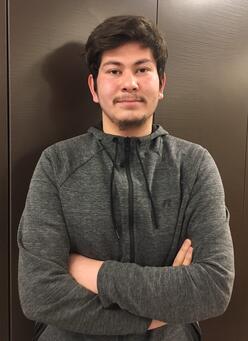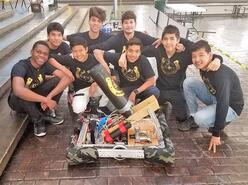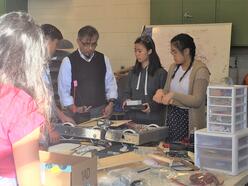Abdul Bari is a dedicated, hard-working and optimistic student. When he and his family arrived from Afghanistan last year, he noted, “Everything is like a 180-degree change. You have to start from zero and it takes time to reach the life you had [in your former country]...it’s very hard if you go to a new country where you don’t know the language, you don’t know the culture, you don’t know how the weather is. It’s very hard.” Despite the challenges of resettling in Salt Lake City and adapting to a new environment, Abdul keeps a positive attitude: “If we try, we can pass all those bad things and see a bright life in the future.”

Abdul Bari has come a long way since his arrival last year—he is now a high school senior getting ready to graduate on time with the rest of his class—a huge accomplishment in itself. He remembers his first days of school: “I just sat at the back of the class and I sat alone and didn’t talk to anyone. At that time, I was very sad, I just sat at the back of the class and didn’t participate in competitions or any activity in our class.” Now, Abdul Bari not only succeeds in academics, he excels.
“One of my favorite and best classes is New Americans in Action because they help me to be a leader, a real leader.” New Americans in Action is a course offered at Abdul Bari’s high school, coordinated by the International Rescue Committee in Salt Lake City and designed specifically for students with a refugee background. The program allows refugee and New American students a safe space to learn skills that will promote future success and build a foundation for academic advancement.
Abdul Bari especially recognizes and appreciates the support of his program teacher and Alaa Al-Barkawi, the IRC's college & career readiness specialist, “They are the reason I became a leader. After Alaa worked with me, she helped me to become a leader, she brought a lot of materials for me to improve my English skills, and also I participated in different competitions, conferences, tutoring. Those things, those activities helped me to become a leader and I became social again.”
After being invited last minute to participate in a MESA (Math, Engineering, Science Achievement) competition last year, Abdul Bari demonstrated newly developed skills, “I wasn’t on the team before, I didn’t realize I’d have to present in front of the judges. I went there and learned the information quickly...We took third place. [My teacher] chose me as president of the MESA team [after that].”

Abdul Bari's path to leadership did not stop as the MESA team president. Soon after arriving at his new school, he attended a school assembly and realized the lack of representation the teams held: there were no immigrant or refugee students on the teams. "We have a lot of students that have refugee and immigrant background, but they aren’t on a team or a club. That made me very sad, I thought ‘Why? What is wrong with us that we cannot be on that team, why aren’t there refugee or immigrant students on that team?’ and I’m always thinking how we can be a team or how we can represent a team [to] show that we are also a part of this school and we are working to bring achievement to our school.”
Abdul Bari found a proactive solution: he decided to found the school's robotics team and now acts as its president. “The reason that I run this club was helping those students that have talent but never show up and they are still part of this school. Most of those people that never show up are refugees and immigrants. They have talent but nobody is helping them. I feel this is my responsibility to help people who have talent but don’t show up. I run this club for those students, we are all at the same level and we work very well together and we have a good relationship with our team members. This club has engaged and encouraged them to show up and be a leader. All of us are here, we came to the United States, we live here, so we have the same opportunities.” Currently, 90% of the members participating in the robotics team are from a refugee or immigrant background.
Being a new team, Abdul Bari says it will be difficult for them to take first place this year, but hopes “we can take the title of Rookie Team this year. I am working with [the team] very closely to take maybe third or fourth place next year, at least come in top ten.”

Abdul Bari’s goals and achievements don’t end there. He continues to involve himself in programs throughout Salt Lake County, joining a soccer club, an advanced robotics club and a team leadership club. He also volunteers much of his time.
“I have no job, I am just working for free helping people because they help me to be a good leader, and I want to help them back.” He volunteers each week at an afterschool program for refugee children, mentors a youth refugee leadership group and assists with a robotics club for 4th-8th graders. Because of his involvement and service, Abdul Bari received the title of Civic Engagement Youth of Salt Lake County 4-H program, an award granted to him out of over 1,000 volunteers. This year, he was also nominated as Promise South Salt Lake's Leader of the Year.
After his graduation this spring, Abdul Bari hopes to continue his involvement with the robotics team: “I want to be a mentor of them, I want to keep working with them and be a mentor for them, and see them in the highest part of the competition.” Abdul Bari's future is bright: he hopes to attend medical school, become a doctor and ultimately working to help people in his home country of Afghanistan.
We are proud to work with refugees like Abdul Bari. He is one of many reasons we continue to stand with refugees: today, tomorrow and always. Learn how you can support refugees like Abdul Bari on their path to success by visiting Rescue.org/SupportSLC.